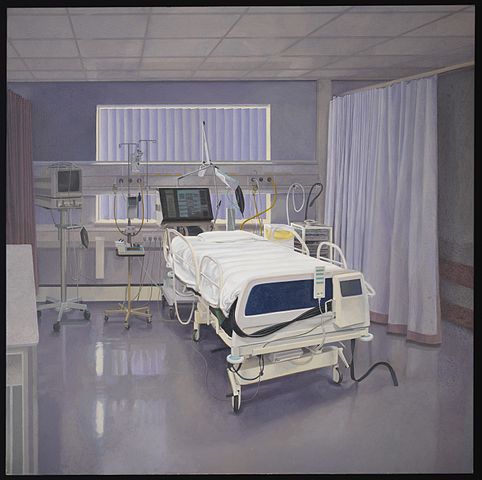People who survive life-threatening illnesses in the intensive care unit (ICU) of a hospital are at high risk for depression and anxiety and nearly a quarter suffer from post-traumatic stress disorder (PTSD), according to new research published in the journal of Critical Care Medicine. The study, conducted by researchers at Johns Hopkins University, found that, following a stay in the ICU, patients who are young, unemployed, female, or who are prescribed opioids longer-term, are at the highest risk for persistent psychiatric symptoms.
“PTSD can drastically impact a person’s ability to communicate and connect with others, truly interrupting their lives and preventing experiences of joy,” Joe Bienvenu, a psychiatrist at the Johns Hopkins University School of Medicine, said in a press release. “This is why our findings are important and why it’s so critical that we continue to research ways to prevent PTSD.”

*
Joseph Bienvenu, Elizabeth Colantuoni, Pedro A. Mendez-Tellez, Carl Shanholtz, Cheryl R. Dennison-Himmelfarb, Peter J. Pronovost, Dale M. Needham. Cooccurrence of and Remission From General Anxiety, Depression, and Posttraumatic Stress Disorder Symptoms After Acute Lung Injury. Critical Care Medicine, 2015; 43 (3): 642 DOI: (Abstract)















Please consider the following as a front page article on Post Traumatic Stress Disorder –
The Transcendental Meditation program has been endorsed by the U.S. Department of Veterans Affairs (VA) for over 20 years for soldiers with PTSD.
Kindly watch and share with all –
“PTSD and Transcendental Meditation – David George, Infantryman” (2:34;https://www.youtube.com/watch?v=6ki4c-XkYsM / excellent!)
and
“Transcendental Meditation Improves Performance at Military University” (5:12;https://www.youtube.com/watch?v=oIH0913lQe0 )
Also see, “Use a Treatment for PTSD That Actually Works” in The Hill, Washington DC
http://thehill.com/blogs/congress-blog/healthcare/262340-use-a-treatment-for-ptsd-that-actually-works
and
“Transcendental Meditation May Reduce PTSD Symptoms, Medication in Active-Duty Personnel” in EurekAlert (01/11/16)
http://www.eurekalert.org/pub_releases/2016-01/mcog-tmm011116.php
Thanks!
Bill @ BillsArtBox.com
P.S. Please visit http://www.operationwarriorwellness.org/ for more information.
Note: Results are available for long-standing PTSD symptoms, as well, including for Vietnam Veterans.
Also, see the dramatic effects for Domestic Post-Traumatic Stress Disorder for women and children, and for PTSD for “First Responders”, at http://www.davidlynchfoundation.org/#video=6gM_sXiUPvo (5:24)
Also, from http://www.army.mil/ :
“Transcendental Meditation – a Path to Healing”
“Doctors promised him through medication and hard work he could potentially heal over the course of years, but since transcendental meditation he has moved much closer to achieving his recovery in months.”
Report comment
“Needham and his team say that young age, female gender and joblessness are important risk factors for having one or more psychiatric symptoms,” could this be considered discrimination against young stay at home mothers? I do know my medical records clearly state the medical community does believe a woman who was an active volunteer (30+ hours a week) / working artist (20+ hours a week) / stay at home mom with two young children (constantly working) was “unemployed.”
And I will mention that landing in an ICU is likely often caused by iatrogenesis. I do know my father landed in an ICU, due to being given the wrong amount of a medication, since a friend down the hall from him got the same wrong dose of medication at the same time.
And the MO of today’s medical community, when it comes to covering up iatrogenesis, is to defame patients with DSM disorders, which discredits the patient. Then they poison, torture, and try to murder people who have dealt with prior iatrogenesis, to proactively prevent non-existent, but potential, malpractice suits. This was my experience, and I even had a client who spent two hours telling me about how this almost happened to her, so I do now know this “dirty little secret” way of proactively preventing malpractice suits is quite common, especially when it comes to the medical community’s maltreatment of women.
Report comment
I suppose this must be because people in intensive care units have a biological predisposition to anxiety and depression that makes it more likely they’ll be severely ill or injured leading to worsening depression/anxiety from their stressful experience.
It couldn’t be that depression/anxiety/PTSD is caused by exposure to highly stressful events… Nah…
—- Steve
Report comment